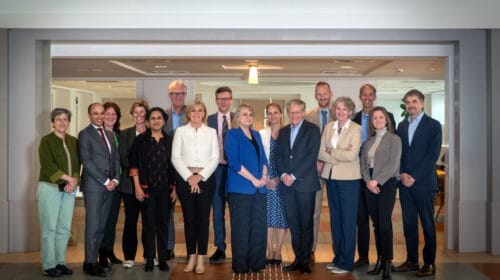Hullabaloo of Nigeria’s Democratic Transitions

By Prince Charles Dickson PhD
By 1983, the army had struck and aborted the second republic, but here we are, the 10th Assembly will soon resume, and it’s been 24 years of a hullabaloo democracy; many are not happy, but we are making some form of progress, there’s been no martial music.
Despite the heated controversies in Lagos and other places, the death toll as a result of gun-throttling ballot snatchers reduced, and the magic figures of the Kardashian states also have reduced. However, we still have a marathon on our hands, but sadly we are building on some shenanigan principles that don’t spell well for us.
I recall in our recent democratic journey, a governor that had won a second term, after being sworn in, blamed his predecessor for huge debts and unpaid salaries…and more. Someone had to tap him, reminding him that he was the predecessor.
In this dispensation, another governor simply refused to sit on the seat of his predecessor, and others would embark on a sacking galore, after all, only weeks to the end of the last man on the helm, there were loads of hiring, firing is then in order. I know that it is a lie that the Zamfara state governor declared N9 trillion in assets, but not to worry, many would declare outrageous sums (forgetting that we know their real worth), while others would dance the musical chairs, refusing to declare.
The block and freeze accounts group would be at it, accounts that would be elapsed after the initial gra-gra, where there are democracies, in many parts the governor would make statements banning payments of one levy, tax or union dues, but trust me, these payments would come back.
Most of the new governors have dissolved state councils, boards and parastatals. Some governors will demolish, either immediately or later, the new kids on the block must chop, new Heads of Service, and all those new commissioners etc.
This new administration has taken off with subsidy removal. A most contentious issue, one that every energy moron and fuel expert has an opinion on.
What exactly is deregulation? How exactly does this subsidy work? I have talked to government officials, petroleum marketers, a few ‘big boys’ in NNPC, and a couple of eggheads. The truth is that they do not know, or better still, they know but cannot explain what these terms mean.
All the grammar boils down to an inability of a system to solve a problem because a strong group of persons are benefiting from that problem. It also is an indictment reflective of the faulty planning by those in charge, that’s if they plan at all.
The government tells us that it cannot influence the price of the product since deregulation is the in-thing, but in common sense, no one has been able to tell us how fellow oil-producing nations have successfully dealt with their petroleum needs.
A friend suggested why don’t we go to Angola, Venezuela, or Brazil and just steal their blueprint? It’s working for them, let’s just stop these subsidies and deregulation grammar and deceit of subsidies and duplicate their success, localize it for the collective good of Nigerians, but of course, the term ‘collective good’ is an alien term to us. Insecurity won’t allow our newly old train systems to work, blue and green rails at cutthroat costs have not reduced the cost of transportation or eased people’s burden, our waterways are wasting, you are riding bicycles, car drivers would knock you down.
It is a sad picture of a society that has lost balance; the ruling class needs to be taught a bitter lesson; they need to be made to bleed, Nigeria’s live at less than a dollar a day while a few flaunt a nation’s collective wealth, so if the current administration is scraping subsidies, it should be supported, but it can’t get that wholesale support because of trust deficit.
No number of essays or commentaries can explain the impact of fuel, cooking oil and diesel on the economy; it’s like explaining the impact of constant electricity on national life. These are terms those in power do not seem to grasp; the reasons are way simple, too…one, they have big power-generating plants in their homes and offices. Two, some of them cannot really recall when last they were in a fuel queue and with millions of naira in remuneration and salaries, what do they care?
The NLC died a long time ago courtesy of an Obasanjo-inspired poisoning, aided by the greed of those put at the helm of its activities, its only panacea being strike and strikes.
Over two dozen fuel price increases since 1978, five times it was reduced minimally but hiked back almost immediately. From N8.45 in 1978 to N65 in 2009, representing an increase of almost 60,000%, the trend has simply continued. In 1978 when the first increase was announced, one of the reasons given was that a majority of petroleum users were using it for pleasure, and there was a need to bring discipline into society. Strange thinking, another reason was that N95 million was being spent a year on subsidies.
As of this year, we are talking in trillions; where is this money coming from, how does this subsidy thing work, how can you deregulate when your refineries are not working? How do you pay subsidy cash and still do crude oil swaps? Who can really explain the fraud called Direct Sales, Direct Purchase DSDP? I have not touched all the loops like bridging costs, demurrage, and forex fluctuations that marketers play with, minus selling at international prices to neighbouring countries. Even the commissioned Dangote refinery has not started working and is not starting anytime soon. You will see that wahala dey!
The top echelon of society cannot explain to Nigerians exactly the reason why we cannot buy fuel at an affordable price for three years in a stretch without scarcity. Not every Nigerian is a novice to the political, economic or social implications of oil pricing. However, the ordinary Nigerian suffers this failure and complacency of leadership.
Subsidies and deregulation mean the price will ultimately fall, and money will be channelled to other areas of the economy; in local parlance…’our leaders like to mumu us’. When the broadcast industry deregulated, we saw the instant benefits, the same applies to telecoms (although we pay some of the highest tariffs in the world); we saw and are still seeing the benefits. But once you hear these terms in the petroleum sector, it’s like it stands for the disappearance of the commodity, and when it reappears, its price increases.
Who are those responsible for the billions and trillions that disappear in subsidies, who are the few that want to punish the majority? All the best explanations of the government, until it is seen to be done, are more of hullabaloo.
Why is it that this policy to a large population of Nigerians is simply a tightening of the screw of poverty, no massive improvement of our colonial rail system, no free education or healthcare, no social security, or unemployment benefits?
Legislators neither here nor there, governors supporting with both sides of their mouth at variance, everyone on top supports, and every person underneath suffers it; in all the noise, the product disappears. Transportation fare increases, food prices skyrocket…a nation that has a disconnect between the ruled and its rulers.
The subsidy has become part of our transitions; if this government gets it right and can pull this off with a humane face, it will get a lot of things right, but the citizens need to play their part, the Yorubas say Ẹni tó tan ara-a rẹ̀ lòrìṣà òkè ńtàn: àpọń tí ò láya nílé, tó ní kí òrìṣà ó bùn un lọ́mọ. This means it is the person who deceives himself that the gods above deceive: a bachelor who has no wife at home but implores the gods to grant him, children. (It is self-deceit to expect the gods to do everything for one when one has not lifted a finger on one’s behalf). I can only say—May Nigeria win!




